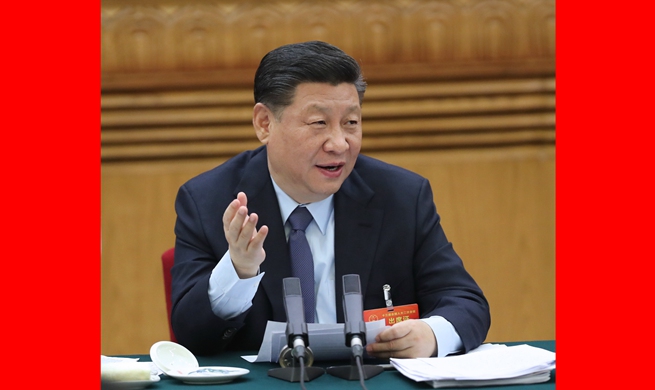by Hazza Harding
GUANGZHOU, March 12 (Xinhua) -- When Sara Jaaksola from Finland introduces herself and her work to others, she is often met with jaw drops and surprise.
Though it is not uncommon for expats to work as teachers in China, the 31-year-old specializes in a subject that is usually the domain of those born and raised in the country: Mandarin Chinese.
As China's global influence has grown, so too has the number of foreigners learning Chinese.
Back in 2005, only 117,660 non-native speakers took the Chinese Proficiency Test (HSK), while by 2010 the number had surged to 670,000.
Latest figures from the Confucius Institute also indicate that, as of the end of 2018, there were almost 150 million people around the globe studying Chinese as a second language.
The surge in the number of Chinese learners has generated higher demand for Chinese language instructors. Jaaksola is one of the few non-native speakers helping to fill the gap in Guangzhou, capital of south China's Guangdong Province.
Jaaksola arrived in Guangzhou as an exchange student nine years ago after seeing a flyer in her hometown offering exchange opportunities to China. She has since completed her master's degree in teaching Chinese as a second language at Sun Yat-sen University and now runs her own start-up business that teaches Chinese to foreigners.
Her more than 60 clients include entrepreneurs, students and the spouses of foreign diplomats. China's continuous opening-up has seen an increasing number of foreigners settle down in Guangzhou, meaning business is booming for Jaaksola.
"At first, people needed to speak Chinese mainly for their jobs, but now more spouses are looking to learn," Jaaksola said. "Nobody is forcing them to learn; they have a genuine interest in Chinese culture."
Despite not being a native speaker, finding students has not been a challenge for Jaaksola, whose students come from countries including Australia, India and those along the Belt and Road, proposed by China to link Asia, Europe and Africa with better infrastructure and trade.
Jaaksola has also faced skeptics. When her students showed her photo to their parents, the response is often "why did you go all the way to China to learn Chinese from a foreigner?"
However, once people get over the initial surprise, it is mostly smooth sailing from there, she said. "Foreigners like to learn Chinese with me because I can understand what they're going through."
Guangzhou's open attitude toward young entrepreneurs has helped Jaaksola build up her business. "In the beginning, we found an excellent location and good services at a lower price," she said, praising the city's co-working spaces available to entrepreneurs.
As part of the Guangdong-Hong Kong-Macao Greater Bay Area, Guangzhou is building itself into "the model for nurturing internationalized talents." The recently released development plan for the area has called for strengthening "exchange and integration across different cultures."
"The business environment in Guangzhou is full of entrepreneurial spirit, and no matter what you want to do, you can achieve it here," said Jaaksola.

















